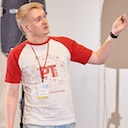Moscow Python Conf ++ 2019 is the first conference where we prepare part of the speakers from scratch by ourselves

"If you want to do something well, do it yourself." On April 5, 2019, we are conducting the 4th Moscow Python Conf , and I decided to conduct a strange experiment: see what happens if you turn the preparation of reports upside down.
As is usually done, Call for Papers opens ( here it is , it ’s open, nothing happened to it), a month or two or two the organizers persuaded top speakers to offer reports, they fight off with work and family, and then out of a hundred or two reports, several dozens are selected. program, and all exhale. A good way, with one ma-aa scarlet flaw: a lot of accidents.
It’s not a fact that even an experienced speaker can make a strong report on the proposed topic. "Active" speakers in well-known companies may be busy or want to another conference. Many interesting topics can pass by simply because ten people of the program committee did not know about the huge tangle of Python in the depths of IVI.ru and no one wrote to them.
I decided to try to follow the Goblin Slayer path and not throw the dice at all: I myself would come to visit the companies, conduct the interview myself, select the topics and prepare the speakers from scratch. You should see their eyes from such an offer ... There will be no pictures, but under the cut I will tell you what happened.
We moved the conference from autumn to spring, so immediately after the completion of the autumn Moscow Python Conf ++ # 3 I went to the people. In the role of the people were large IT companies, with DevRel'ami of which I was already familiar or talked on the past HighLoad ++: hh.ru, Domklik, Avito, S7, Tinkoff, Iponweb, Yandex, Rambler, Cyan - the list is long. I offered everyone the same thing:
- I come to visit with a bucket of coffee and talk with developers who know about Python in the company. If there are promising topics - take the contacts of those with whom you can call 1-on-1 and talk for the code.
- I'm calling up to the developers, collecting invoice.
- If there is a theme and texture to it, then I suggest preparing the speaker from scratch according to my own method. The speaker prepared in this way automatically enters the conference program.
What is interesting: of those companies to which I reached and in which Python is used, nobody refused . Probably everyone wanted to see what a bucket of coffee looks like. Like this:

Interview with companies. Python is there? And if you find?
Python and interesting topics I found at all. How did it usually look like? From one to ten developers, timlids and technical drafts gathered around me, to whom I briefly told my proposal, the concept of a professional conference and offered to tell "what the company is doing with the participation of Python." The unsure at first story quickly turned into a discussion “and we also have ...” and after about twenty minutes I switched to clarifying questions, choosing the most promising topics for the conference.
The key to this interview is to remember why we are going to a professional conference. Since the days of the school and the institute, we have a conviction that a conference is a place where people go to learn, to learn something new. This is an “automatic” answer that our brain generates to the question “why go to the conference.” Automatic and incorrect - how can you “learn” in a 30–40 minute speech of a speaker who prepares him for the widest possible audience? Learning and learning new things is about the Internet. Official documentation, reddit, hacker news, medium, habr, stackoverflow and other resources.
What topics are interesting conferences?
Conferences - about communication. On the Internet there is all the information. But we, as developers, do not need all the information. We need the most important and answers to questions. Personal experience in the use of technology and the solution of various tasks "in the market" of cool companies. You can talk about all this over a cup of coffee (and then beer on aftapati) at major professional conferences.
If you look at the conference from this angle, why are there speakers on it? The speaker sets the topic for the conversation and tells about the internal experience of the company: all that is not on stackoverflow and on Habré. I look for such content in an interview, asking questions “what is going on in you, what is not written in the official documentation and stackoverflow?”. And something interesting always happens: every large company with Python development has its own unique serpentarium with its own tasks, difficulties, problems and solutions.
Conference Moscow Python about everything that Python developers do. Backend, number shredders, Machine Learning, Big Data, web development, mobile apps, testing and code deployment and dozens of other topics. Iponweb, for example, generates unique admin panels for each client in Python. And the speaker will tell you what difficulties arise and how to properly turn Django inside out for such tasks.
One-on-one invoice collection through Zoom. What is texture?
At the end of the face-to-face interview, I collect contacts of developers, with whom I arrange small ones a few days later, I called Zoom for 20-30 minutes. A very handy thing for video calls: unlimited free video calls for two users, you can write videos to your computer, there are no typical “peer-to-peer-to-peer” problems “the call failed.” The only minus in my opinion is a strange usability solution with a hidden “join with computer audio” button: a connected video call participant sees the video, but does not hear the interlocutor and cannot be heard either. But if you explain about this button in advance, then there are no other problems.
I am already discussing the code with the developer - is there enough material for the report? On full-time brainstorming, many things are not remembered in the way that they are in fact, subsequent phoning with the developers correct this gap.
Having phoned everyone, I make an offer to the company on the most appropriate topic from my point of view. In response, the company gives me a speaker: usually, the one with whom I spoke via Zoom for the code.
Speaker training
On average, the report takes a dozen video calls for 30-50 minutes each. The preparation is in the form of an interview, where I ask a million questions and dig up the unique experience of the company, and the speaker acts as a source of knowledge. Rough preparation consists of four parts:
- Collection of the invoice : first, everything that was collected at the previous stages on the chosen topic is copied here, after which I fall asleep the speaker with questions until I see enough material and value for the 30-minute report. Usually it is 2-3 calls, in the intervals between which the speaker returns to the team and clarifies the details and nuances.
- Report outline : after examining the invoice, the speaker and I arrange the facts so that we get an interesting story. I usually use a snoop, but in extreme cases, you can use ready-made journalistic approaches. This is the most difficult stage in the formation of the history of the facts is not needed, but there may be new interesting details about which you need to learn more.
- Slide - making is the simplest step. Having a plan for the report, experience from hundreds of speeches and an understanding of why slides are needed, they are easy to make. Lists, charts, funny pictures and arrows in unexpected places will help the audience to follow the speaker’s story, see key words and not lose the outline of the story.
- Cutting double-sided slides . The big cheat that we use during speeches: the speaker sees the hints in front of him, which are located in the “speaker notes” section and divide the report into many, many small, isolated stories. How it works can be viewed here in this video:
Call for papers
In this way, we scored more than ten speakers (for some of the companies, the speaker has not yet been selected, so I’ll not give the exact number). In addition, there is a traditional Call for Papers and a program committee that will phone with each person who submitted the application, talk about the topic and then select the best. In our program committee:
 Alexander Hayorov
Alexander HayorovDev Lead in Chainstack. He likes Python and sneaks in on it. And as far as public clouds are concerned, Kubernetes, Istio and DevOps / SRE practices are a passion and area of unlimited interest.
 Vladimir Filonov
Vladimir FilonovCTO in itcanfly. The developer of a wide profile and one of the organizers of the Moscow Python community. Loves Python, Erlang / Elixir, asynchrony and TDD. He likes to dig in the guts of libraries, and then talk about it.
 Zlata Obukhovskaya
Zlata ObukhovskayaTimlid in Nvidia. I know the Python ecosystem for ten years, during which time I tried different things: from Data Science research to the development of highload projects and leadership teams. Recently she has been teaching Learn Python, studying themes of mentoring and professional development of developers. He is interested in distributed systems and the construction of technical communities. Can talk for a long time about the technological culture that should be fueled by strategy.
 Ivan Tsyganov
Ivan TsyganovSoftware developer at Positive Technologies. Python programmer. Speaker of many conferences for programmers and testers. He was preparing the largest information security conference in Russia - PHDays. Slowly but surely gathers himself a truly smart home.
 Leonid Kalneus
Leonid KalneusDevRel in DataArt. Organizer of a number of Siberian developer communities, DevFest Siberia Conference, Gophercon Russia. Loves Python, writes on Go :)
 Nikita Sobolev
Nikita SobolevCTO in wemake.services. Most of all likes to customize technical processes in companies. He actively writes open-source and speaks at various conferences: from HR to functional programming. Loves Python and Elixir. Uses JavaScript.
 Dmitry Nazarov
Dmitry NazarovPython TeamLead in DataArt. Flagship figure of the Python-movement, a member of the program committees of conferences: PiterPy (2017, 2018), PyCon-LT, Moscow Python Conf ++. Co-founder of projects PiterPy Meetup, Django Girls SPb, PyLadies SPb and SPb Reliability Meetup. He loves web, startups and doing IT-events. Curator of Learn Python courses. He performed in Moscow, Lisbon, Berlin, Minsk, Lithuania. The mascot of the conference index-tech.ru and writes about the problems of hiring.
 Andrey Vlasov
Andrey VlasovPyCharm Techincal Lead in JetBrains. Developer and software architect. He has been working in software development for over 10 years. He has experience in developing software design support tools (build and deployment systems, parsers, source code analysis), web application development, data analysis systems.
Especially for Habr
I have another slot to prepare the speaker from scratch. Before the conference, a little less than three months, and if you have an interesting topic - submit it via Call for Papers marked as “special project for Habr.” I will phone with all the speakers who have submitted a report, and if there are interesting topics, I will take one to prepare by the method described above.
